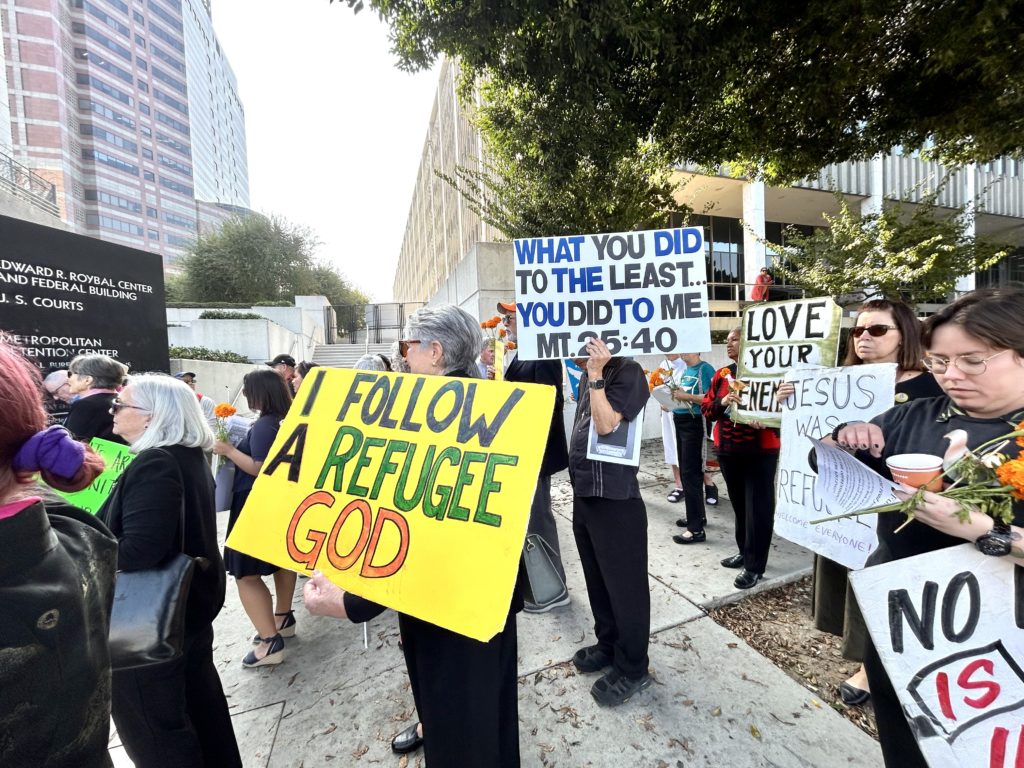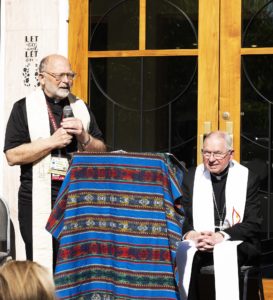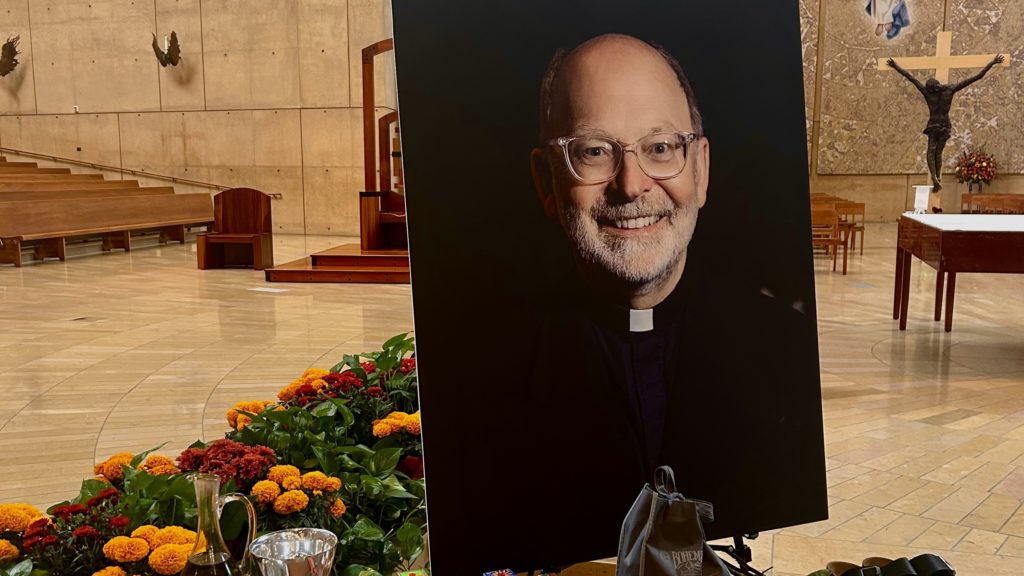After the Nov. 4 funeral Mass for Father Chris Ponnet ended, family and friends gathered on the plaza of the Cathedral of Our Lady of the Angels for a reception.
Soon, several dozen members connected to various social justice groups congregated toward the Temple Street exit. With handmade signs and handfuls of orange flowers, they started the half-mile trek down the sidewalk toward the Federal Building on Los Angeles Street.
There, they met up with a group called the Godmothers of the Disappeared, whose weekly Tuesday vigil encourages the return of family members taken by ICE agents and detained in that facility.
The consensus: This was the kind of act of civil disobedience that Ponnet would have helped organize and implement.
“Father Chris was always a bridge-builder, finding a way to weave together people and organizations,” said Matt Harper, an organizer for the Los Angeles Catholic Worker. “I had no idea who would show up for this or what might happen to all this Catholic energy for justice. But as we were walking from the church to the Federal Building, I just felt this gratitude in whatever part Father Chris played in making this all come together.
At the end of the funeral, Archbishop José H. Gomez called Ponnet’s sudden death on Oct. 7 at age 68 “a surprise to all of us.”
“For all us priests, he was a beautiful example of what the priesthood is all about,” Archbishop Gomez said. “It is important for all of us to make sure the memory of his life and his ministry is with us.”

Father Tim Dyer, pastor of two South LA parishes — St. Patrick and St. Stephen — believes “we have a lot to learn” from Ponnet.
“He put into good language and action the heart of the Gospel. He was genuine with his actions, never looking for the spotlight,” said Dyer.
Prolific author and peace activist Father John Dear noted how many stories were told about Ponnet’s ability to unite different factions of religious and secular communities. The two were arrested several times together during nonviolent protests for social justice causes.
“Chris was a real leader, he knew everyone, and he was one of the brightest lights in Los Angeles,” said Dear, who had known Ponnet for more than 40 years. “He showed what it means to be a good Christian, a good human being — and there aren’t many like him.”
Born in Monterey Park, Ponnet was the youngest of eight children in a family that lived in Temple City and attended St. Luke Church. Ordained in 1983, Ponnet was at Our Lady of the Valley Church in Canoga Park and Our Lady of the Assumption Church in Claremont before becoming the longtime pastor at the St. Camillus Center for Spiritual Care, next to the LA County USC Medical Center. He soon became the director of its Department of Spiritual Care.
His sister Elizabeth, who proclaimed the first reading at the funeral, told the Los Angeles Times that when Ponnet recited Martin Luther King’s “I Have a Dream” speech as an eighth-grade project, “that’s when I thought he would be involved in service and helping people for the rest of his life.”
Ponnet said his many prolonged hospital stays due to heart-related medical issues showed him the loneliness they can bring. Faith was needed during trauma, he believed, and that inspired his ministry to accompaniment — especially with COVID-19 patients during the pandemic, separated from families who often died with only him present.
Heather Banis, coordinator for the Archdiocese of Los Angeles’ Victims Assistance Ministry, said part of Ponnet’s legacy was helping to start “Garden of Healing” projects for clergy sexual abuse victims.
“Father Chris embraced the idea wholeheartedly,” said Banis, noting the first garden was created through his planning and design work right at St. Camillus Center. Several more gardens have been created in the archdiocese since.
As part of the project, Ponnet also worked with abuse survivor Joe Montanez, whose vision inspired the gardens.
“Father Chris gave me so much support,” Montanez told Angelus. “He was such a witness for Christ. He will always be a positive force in my continued effort in creating healing spaces for those abused.”

Steve Rohde, chair of the Interfaith Communities United for Justice and Peace (ICUJP), first worked with Ponnet on the board of directors of Death Penalty Focus 30 years ago. He said the experience taught him ways to process and communicate ideas into actions.
“He always chose his words carefully, listening to what others had to say and speaking only when he could contribute a new or clarifying thought,” Rohde said. “But when he spoke, there was a moral force behind his words. And when he disagreed, he found a way to express his differences with respect and utter civility.
“I was in awe of his courage in committing to civil disobedience and getting arrested to protest injustice, always exhibiting a calm and steely strength as he was handcuffed and led to jail.”
Death Penalty Focus president Mike Farrell said he was “stunned” by the tribute to Ponnet at the funeral Mass.
“It’s wonderful to think they cared so much about this man who was so humble and so unassuming and so decent — not a mover and shaker in the general sense of the term,” said Farrell, who worked with Ponnet for years on legislation. “He was just someone who reached out and touched everyone possible in his life.
“I’m proud to be associated with him.”
In the funeral homily, Father Mike Grieco said the Gospel passage from the beatitudes (Matthew 5:1–12) proclaimed at the Mass was a description of his friend’s life.
“He leaned into the goodness of people,” said Grieco, associate pastor at Holy Redeemer-St. James the Less Church in Montrose. “He was a prophetic voice that we can be advocates for the lost, forgotten, or forsaken. He was about accompaniment. He lived his call.
“People remember when you show up, and remember when you don’t show up. Chris showed up.”

